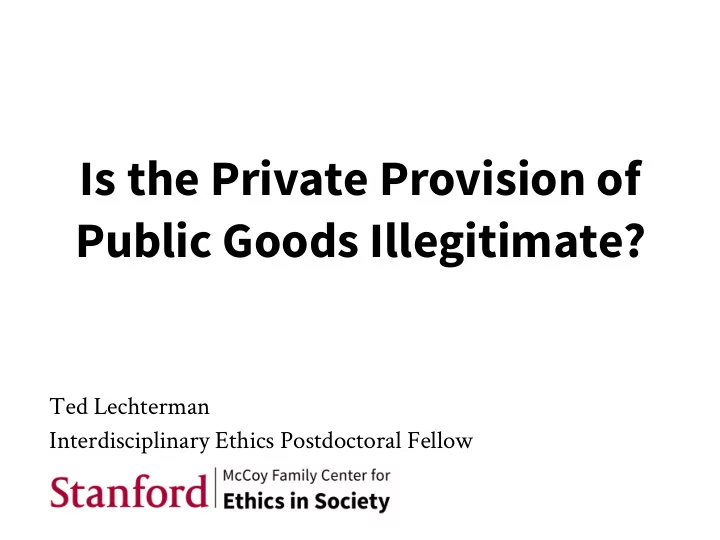

Is the Private Provision of Public Goods Illegitimate? Ted Lechterman Interdisciplinary Ethics Postdoctoral Fellow
Political Theory and Public Goods • Most existing work considers the permissibility of state provision • This work was developed during the heyday of the welfare state, when gov’ts actually provided public goods • I want to consider whether or when state provision is obligatory (and private provision is therefore objectionable)
Methodology • Basic strategy: (1) identify the intuitive discomfort we have with privatization by using thought experiments to isolate different variables, then (2) articulate a theory that best explains this discomfort. • Reflective equilibrium: canvas our considered moral judgments, formulate a principle designed to explain and justify these judgments. Mutually adjust considered judgments and the principle until we find a stable balance (Rawls 1999).
Existing Accounts (1) • Utilitarian: public goods provision is a collective action problem. Because of free-riding, private groups fail to provide goods in the quality/quantity desired. • But this not always the case, and “moral remainder” persists (Beerbohm 2016). • Republican: private providers dominate recipients (Pettit 2013). • But this is not necessarily true.
Existing Accounts (2) • Communitarian: private providers undermine the “social meaning” of public goods (Walzer 1983; Nozick 1996). • But societies disagree vehemently about the constitutive values of any given public good. • Egalitarian: private provision prevents us from contributing our fair share to the project of distributive justice (Beerbohm 2016).
Thought Experiment: Zuckerberg’s Porch (1) Imagine a nearby possible world in which the tax system is well designed to ensure that all citizens contribute their fair share— just as the egalitarian view would have it. On April 16, however, the tax revenues for the preceding fiscal year get lost in transit. The Treasury had converted the tax returns into a form of currency, and it is shipping the whole sum via plane to a new location for safekeeping. Then disaster strikes, as some kind of extreme weather event rips open the plane’s hull and sends all its contents hurdling into the abyss. As it happens, the tax revenues all land squarely on Mark Zuckerberg’s porch. (cont’d)
Thought Experiment: Zuckerberg’s Porch (2) That very morning Zuckerberg had come across Beerbohm’s article. He now feels guilty about some of his previous philanthropic ventures, which attempted to provide essential public goods by leveraging his own wealth. But he sees a new possibility at hand. He will take the tax dollars, and using Facebook’s superior technological resources, he will realize principles of distributive justice in a spectacularly efficient way. Treasury officials learn that Zuckerberg has come into possession of the lost tax revenues, and they move to reclaim them. However, Zuckerberg’s legal team quickly reminds them of an obscure constitutional provision that gives landowners the right to appropriate property that accidentally turns up on their land.
What the Experiment Shows • If we find this scenario objectionable, it indicates that fairness isn’t our only, or even our main, concern about private provision • More likely, we’re upset that no one elected Zuckerberg to be justice-administrator. He claims power arbitrarily. • Indicates that something about the value of democracy explains what is wrong with private provision
The Ideal of Democracy • Collective self-determination (popular sovereignty) • Political equality • Deliberation • Substantive reliability
Collective Self-Determination • My paper argues that our discomfort with Zuckerberg’s Porch ultimately boils down to the value of collective self-determination (CSD), a constituent of the value of democracy. • Collective self-determination puts citizens in the driver’s seat and makes our laws and policies reflective of their will. • Without the ability to influence the agents who make our laws, we are alienated from our social world: we feel like guests in a hotel room rather than homeowners (Zuehl 2016).
What Must We Collectively Control? • I propose that our interest in CSD is satisfied when we, through representative institutions, can give direction to fundamental matters of justice: the rights, duties, and opportunities available in our society. • CSD is not an absolute value or something to maximize. But it can explain what’s missing in cases of private provision of public goods. • To be legitimate, those public goods required by justice must be provided by the state. Discretionary public goods need not be.
Conclusion • The state is obligated to provide public goods that are required as a matter of justice. These are goods that protect the basic liberties (like police and national defense) and provide at least for a decent social minimum (like social insurance schemes or a basic income). • Private provision is objectionable when it supplants the state’s legitimate monopoly on justice (though not objectionable all-things-considered). • The argument offers little insight into whether/when the state can permissibly contract out aspects of public goods provision.
References Beerbohm, Eric. 2016. “The Free-Provider Problem: Private Provision of Public Responsibilities.” In Philanthropy and Democratic Societies, ed. in Rob Reich, Chiara Cordelli, and Lucy Bernholz, 207–25. Chicago: Chicago University Press. Nozick, Robert. 1989. Philosophical Meditations. New York: Touchstone Books. Pettit, Philip. 2013. On the People’s Terms. Cambridge: Cambridge University Press. Rawls, John. 1999. A Theory of Justice . Revised edition. Cambridge, MA: Harvard University Press. Walzer, Michael. 1983. Spheres of Justice . New York: Basic Books. Zuehl, Jake. 2016. “Collective Self-Determination.” Ph.D. diss. Princeton University.
Recommend
More recommend